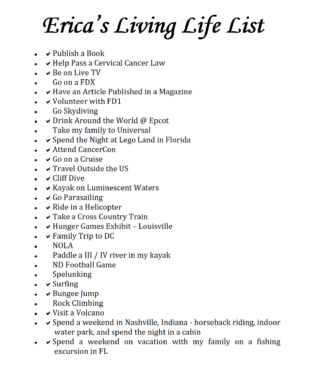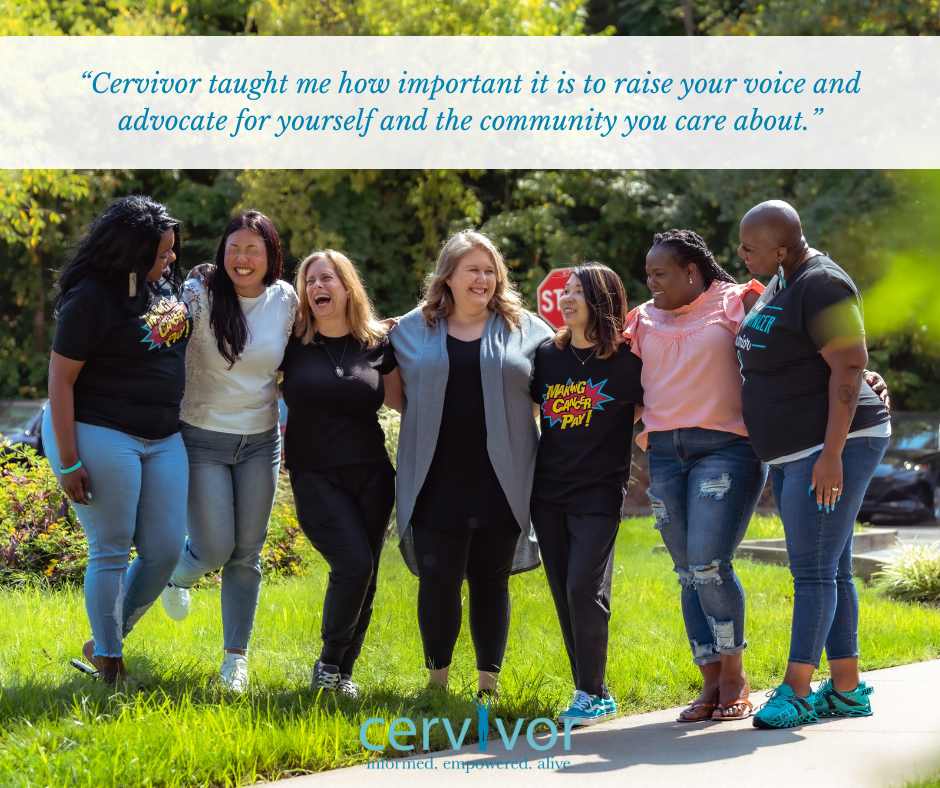Today, we introduce the Living Life List– a powerful spin on the traditional bucket list. Inspired by the remarkable Erica Frazier Stum, our late Lead Cervivor Ambassador. This list is not about checking off experiences before a looming deadline, but about living a purposeful, meaningful, and passionate life. Period.
Erica, who lived with cancer from age 27 to 33, rejected the notion of a “bucket list.” Instead, she created a vibrant, active list of experiences she wanted to have and things she wanted to achieve in her lifetime. She embraced life with intention and joy, refusing to be defined by her cervical cancer diagnosis. Erica would have been celebrating her 39th birthday today.


This list is a testament to Erica’s spirit and a reminder that life is precious, valuable, and worth living to the fullest. It’s a call to action to:
- Pursue your passions: Whether it’s writing, art, or advocacy, make time for what brings you joy and fulfillment.
- Connect with others: Build meaningful relationships with loved ones, fellow advocates, and those who understand your journey.
- Travel and explore: Discover new places, cultures, and experiences that broaden your perspective and nourish your soul.
- Make a difference: Use your voice, share your story, and advocate for others impacted by cancer.
- Practice self-care and self-love: Prioritize your physical, emotional, and mental well-being.
Take a moment to reflect on what YOU want to achieve, experience, or add to your Living Life List:
- What brings me joy and fulfillment?
- How can I make a positive impact in the lives of others?
- What experiences do I want to have in the next year, five years, or decade?
- How can I prioritize my well-being and self-care?
- What legacy do I want to leave for others?
In addition to living a fulfilling life, many patient advocates are driven to make a difference in the lives of others. Here are some questions to help you amplify your advocacy:
- What specific issues or causes do I want to champion?
- How can I share my story to inspire and educate others?
- What organizations or initiatives align with my values and goals?
- How can I mobilize others to join me in advocacy efforts?
- What policy changes or legislative actions can I support to drive meaningful progress?
The Living Life List is a celebration of life, hope, and resilience. It’s a reminder that every day is precious and that we all have the power to live with purpose and passion, just like Erica. We can expand the Living Life List to include our advocacy efforts and increase the impact we have every day. So, take the first step today – start your Living Life List and begin living the life you deserve.

Erica’s impact extends far beyond this blog post. To further celebrate and honor her life, explore the following resources:
- Read her book: Purchase a copy of her inspiring story here: https://amzn.to/3dUoOpO.
- Watch her share her journey: Listen to Erica’s powerful testimony on video: https://youtu.be/CmskqbiTJNs.
- Explore her story online: Read Erica’s story and learn more about her experiences:https://cervivor.org/stories/erica/.
- Tune in to her podcast appearance: Listen to Erica’s episode on the Cervivor Podcast: https://bit.ly/3hM7gO4.
